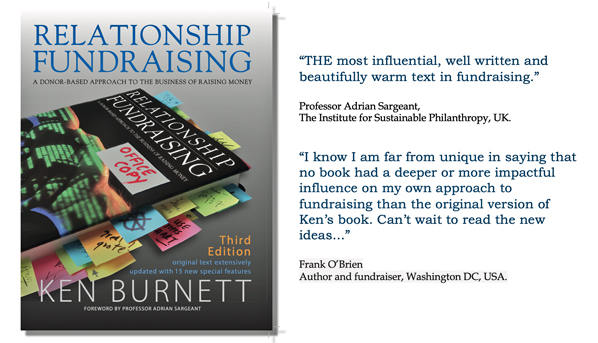| |
 Opinion Opinion
Second in a five-part feature on
the future of fundraising, from
Ken Burnett, author of Relationship Fundraising, (1992).
The first of this series appeared in November 2014 and the final part was published in mid-May 2015.
Intro
The future of fundraising.
Part 1
Why fundraising has to change.
Part 2
A fundraising Utopia.
Part 3
Some keys to
fresh fundraising success. Three mega-opportunities
for fundraisers.
Part 4
Marketing was a mistake.
Part 5
Fundraising and the rule of law.

Ken’s storytelling book (which, not entirely coincidentally, focuses many of its pages on remedies for the issues opposite) is reviewed here and here and you can buy it here.

You can order
The essence of Campaigning Fundraising here. Please follow this link for reviews too.
|
Imagine…
- Real commitment to improving the donor experience.
- A radical vision for the future, where fundraisers become something donors want and love.
- Fundraisers working together to achieve the ideal.
- Substantial investment in staff and systems.
- Patience. The ability to take a long view.
- Integrity, accountability, an absence of sales hype.
- Value, high standards, clear ideals, exemplary donor care.
- Donors choose what they want to give, when, where and how.
- Fundraisers become famous for frequent, fast, fabulous feedback...
- ...and for consistently brilliant customer service.
- Genuine win/win partnerships with donors, carefully managed by fundraisers.
Imagine an impeccable experience for our customers.
What you are imagining is fundraising’s equivalent of these people:

An impeccable customer experience. Consistently.
THE UK BOOK TRADE: what Amazon found:
- A fragmented industry making low profits.
- Chronic under-investment.
- Dismal customer experience.
- Poor customer retention.
- Limited use of technology.
- Steady and persistent decline.
THE UK BOOK TRADE: what Amazon did:
- Took a long view.
- Invested bravely in people, systems and service.
- Developed new standards of customer care.
- Waited patiently.
- Cleaned up.
Amazon UK now thrives and dominates the UK book trade as well as serving many other sectors too. Amazon customers expect and experience an entirely different level of service and support from what was around pre-Amazon. Instructive though their case study might be, something like Amazon couldn’t happen for fundraising, because…
- Short-term thinking so seriously limits the not-for-profit sector.
- Lack of vision and aspiration too.
- Chronic under-investment.
- Absence of unity, inability to invest and work collectively.
- Shackled by insistence upon immediate return on investment.
- Plus failure to work at understanding and appreciating what donor customers really want.
So, our donors remain condemned to…
…A DEPLORABLE CUSTOMER EXPERIENCE.
This may seem a touch harsh. But when considered in the light of all the many ‘mystery donor’ tests conducted by numerous organisations and individuals in all the main fundraising markets around the world over the last 30 years, it might seem to be a considerable understatement.
Mystery shopping tests are a shocking indictment of the state of customer service in our industry. Check them out on SOFII here, here and here. And please feel free to email me your thoughts on this series here.
This is the second of a five-part series considering the future of fundraising, which first appeared late 2014/ early 2015:
Part 1. Why fundraising has to change.
Part 2. A fundraising Utopia. You’ve just read this.
Part 3. Three mega-opportunities for fundraisers.
Part 4. Marketing was a mistake.
Part 5.
Fundraising and the rule of law.
See also the forewords to two important fundraising books published in 2015, here. Retention Fundraising by Roger M Craver and How to love your donors (to death) by Stephen Pidgeon.
© Ken Burnett 2015
Home page | Current blogs | Article archive |
|
‘We’ve had three big ideas at Amazon that we’ve stuck with for 18 years, and they’re the reason we’re successful: Put the customer first. Invent. And be patient.’
‘Are my customers loyal? Absolutely. 100 per cent. Right till the moment someone else comes along and gives them better service.’
Jeff Bezos, founder and CEO, Amazon

From Amazon’s website. Even ‘the smallest improvement’ suggested in line three would be counter-intuitive for a charity. Imagine making it easy for a donor to cancel. While we might think that bad for business, Amazon seems to disagree. Yet they prosper all the same. Could it be they've seen something we’ve missed, that they have grasped something that, so far, has eluded us?
AMAZON facts
- The largest Internet-based retailer in the USA, probably the world.
- Started in 1994 as a bookstore but soon diversifed and now sells almost everything.
- Amazon’s initial business plan was unusual in that it did not plan to make a profit in its first five years.
- Despite being unpopular and even reviled for its cavalier approach to paying taxes and its allegedly poor working conditions for staff, Amazon’s hold on its markets, particularly the UK book trade, seems as firm as ever. Imagine how much better they’d do if they solved those two issues...

The donor experience, at least as I like to imagine it.
NB. Please don't deduce from any of this that I'm an unreserved enthusiast for Amazon. As a small publisher, I’m anything but. Yet as a book buyer, I have to accept that the Amazon customer experience is second to none. So is there just maybe something we could learn from them?
I think so.

|






